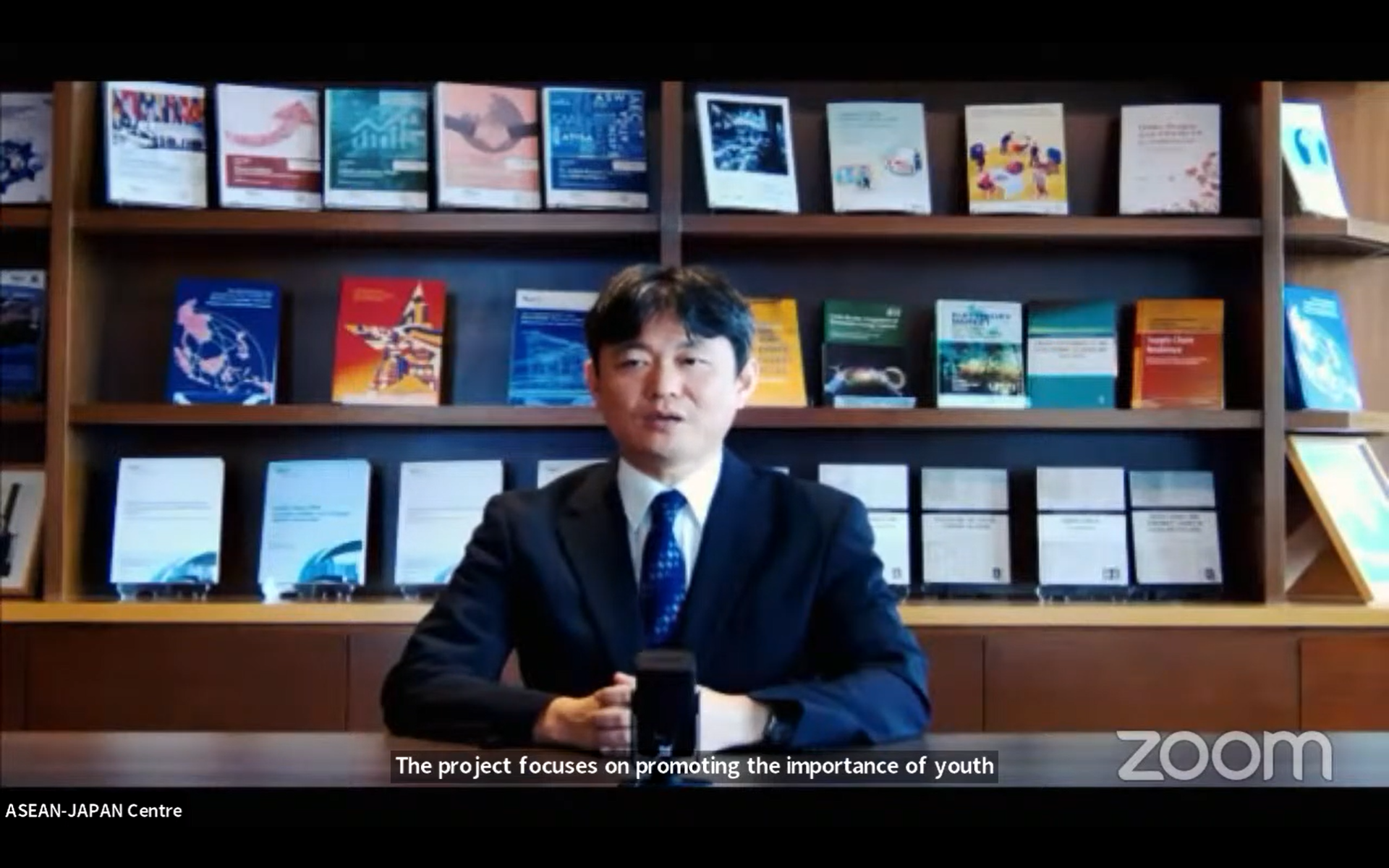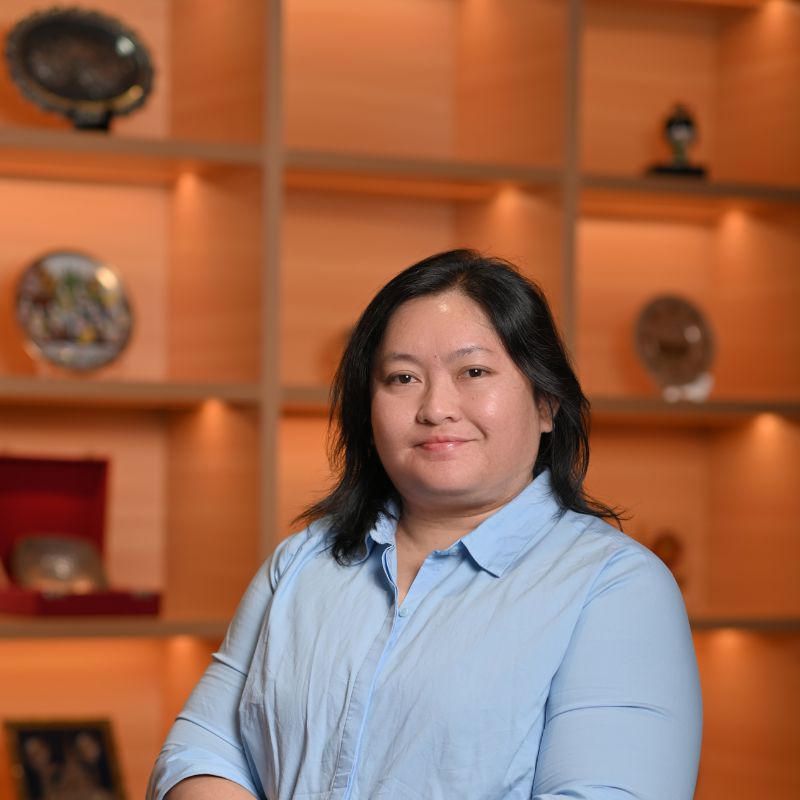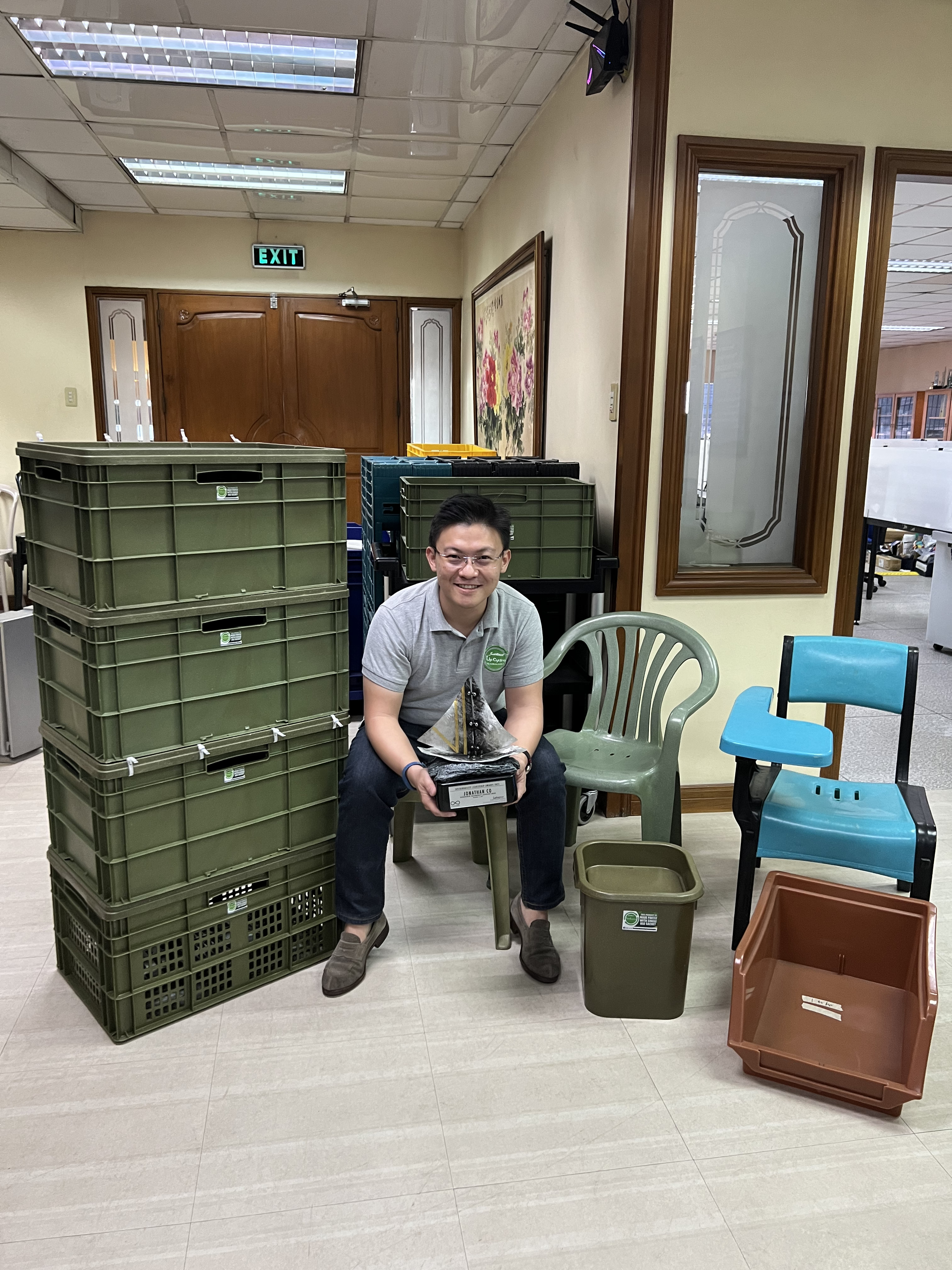

July 26, 2024: the ASEAN-Japan Young Environmental Leaders Network held its Kick-off and Launch Ceremony, which brought together a distinguished group of speakers and motivated young leaders of 15 to 18 years of age from across the ASEAN region and Japan. This event marked the start of the 2024 batch, initiating their projects aimed at tackling plastic pollution issues in their respective communities.
In his opening remarks, Mr Reo Kawamura, Director of the Regional Knowledge Centre for Marine Plastic Debris, emphasised the critical role of youth in driving positive environmental change. He highlighted the potential of young leaders to make a substantial impact on reducing marine plastic pollution. Mr Kawamura also introduced the nine participating youth teams, each working on innovative projects designed to address plastic waste issues within their respective communities.
Secretary-General of ASEAN, Dr Kao Kim Hourn, underscored the urgent need for youth involvement in tackling plastic pollution. He encouraged participants to combine their knowledge, passion, and practical skills to create sustainable solutions. He also called for stronger regional cooperation and support for young leaders as they strive to combat marine plastic pollution, ultimately contributing to a more sustainable future.
Mr Yoshihiro Mizutani, Director of the Marine Environment Division at the Environmental Management Bureau of Japan's Ministry of the Environment, addressed the pressing issue of marine plastic pollution affecting both ASEAN and Japan. He expressed confidence in the young leaders' ability to drive positive change and urged them to take decisive action within their communities to address this shared challenge.
The keynote speech was delivered by Mr Benedict Wermter, Director of Veritas Edukasi Lingkungan in Indonesia. He highlighted the complex issue of waste management and stressed the importance of public awareness, education, and behavioural change in addressing these problems. He stressed the need to focus on prevention and reduction rather than solely relying on recycling and cleanup efforts.
The ceremony showcased project plans developed by young leaders for the 2024 programme.
From Brunei Darussalam, the team is using drama as an educational tool to transform marine plastic pollution from a pressing problem into a manageable solution.
From Indonesia, the team is addressing marine plastic pollution through competitive beach clean-ups, awareness campaigns, research initiatives, and collaborations.
From Japan, the project focuses on experiments and research to create sustainable alternatives to plastics using casein-based substitutes and sharing their findings globally to reduce plastic waste.
From Malaysia, the focus is on empowering local youth and the community through gamified beach clean-ups, hands-on workshops, and an environmental podcast series.
From Myanmar, the project empowers local youth to take active roles in preserving the marine environment.
From the Philippines, the team tackles plastic pollution through workshops with local communities and awareness-raising initiatives.
From Singapore, the focus is on promoting youth involvement in environmental conservation to inspire them to continue current conservation efforts.
From Thailand, the team addresses plastic waste issues by promoting bio-based packaging and adding green spaces.
Lastly, from Vietnam, the team raises awareness about plastic pollution through clean-up activities and recycling efforts.
The event closed with remarks from Dr Chris Hirabayashi, Secretary-General of the ASEAN-Japan Centre. He expressed heartfelt appreciation for the new cohort of environmental leaders, their mentors, and families who support the young leaders as they work on their projects. He also emphasised the collective effort required for a sustainable future and encouraged everyone to carry the inspiration from the event forward and continue driving meaningful change.
The ASEAN-Japan Young Environmental Leaders Network Kick-off and Launch Ceremony signifies a monumental effort in uniting young minds across ASEAN and Japan to address the shared challenge of marine plastic pollution. By fostering collaboration and empowering the next generation of environmental leaders, the AJYELN programme is poised to drive impactful innovation, paving the way for a more sustainable future for the region and beyond.
July 26, 2024: the ASEAN-Japan Young Environmental Leaders Network held its Kick-off and Launch Ceremony, which brought together a distinguished group of speakers and motivated young leaders of 15 to 18 years of age from across the ASEAN region and Japan. This event marked the start of the 2024 batch, initiating their projects aimed at tackling plastic pollution issues in their respective communities.
In his opening remarks, Mr Reo Kawamura, Director of the Regional Knowledge Centre for Marine Plastic Debris, emphasised the critical role of youth in driving positive environmental change. He highlighted the potential of young leaders to make a substantial impact on reducing marine plastic pollution. Mr Kawamura also introduced the nine participating youth teams, each working on innovative projects designed to address plastic waste issues within their respective communities.
Secretary-General of ASEAN, Dr Kao Kim Hourn, underscored the urgent need for youth involvement in tackling plastic pollution. He encouraged participants to combine their knowledge, passion, and practical skills to create sustainable solutions. He also called for stronger regional cooperation and support for young leaders as they strive to combat marine plastic pollution, ultimately contributing to a more sustainable future.
Mr Yoshihiro Mizutani, Director of the Marine Environment Division at the Environmental Management Bureau of Japan's Ministry of the Environment, addressed the pressing issue of marine plastic pollution affecting both ASEAN and Japan. He expressed confidence in the young leaders' ability to drive positive change and urged them to take decisive action within their communities to address this shared challenge.
The keynote speech was delivered by Mr Benedict Wermter, Director of Veritas Edukasi Lingkungan in Indonesia. He highlighted the complex issue of waste management and stressed the importance of public awareness, education, and behavioural change in addressing these problems. He stressed the need to focus on prevention and reduction rather than solely relying on recycling and cleanup efforts.
The ceremony showcased project plans developed by young leaders for the 2024 programme.
From Brunei Darussalam, the team is using drama as an educational tool to transform marine plastic pollution from a pressing problem into a manageable solution.
From Indonesia, the team is addressing marine plastic pollution through competitive beach clean-ups, awareness campaigns, research initiatives, and collaborations.
From Japan, the project focuses on experiments and research to create sustainable alternatives to plastics using casein-based substitutes and sharing their findings globally to reduce plastic waste.
From Malaysia, the focus is on empowering local youth and the community through gamified beach clean-ups, hands-on workshops, and an environmental podcast series.
From Myanmar, the project empowers local youth to take active roles in preserving the marine environment.
From the Philippines, the team tackles plastic pollution through workshops with local communities and awareness-raising initiatives.
From Singapore, the focus is on promoting youth involvement in environmental conservation to inspire them to continue current conservation efforts.
From Thailand, the team addresses plastic waste issues by promoting bio-based packaging and adding green spaces.
Lastly, from Vietnam, the team raises awareness about plastic pollution through clean-up activities and recycling efforts.
The event closed with remarks from Dr Chris Hirabayashi, Secretary-General of the ASEAN-Japan Centre. He expressed heartfelt appreciation for the new cohort of environmental leaders, their mentors, and families who support the young leaders as they work on their projects. He also emphasised the collective effort required for a sustainable future and encouraged everyone to carry the inspiration from the event forward and continue driving meaningful change.
The ASEAN-Japan Young Environmental Leaders Network Kick-off and Launch Ceremony signifies a monumental effort in uniting young minds across ASEAN and Japan to address the shared challenge of marine plastic pollution. By fostering collaboration and empowering the next generation of environmental leaders, the AJYELN programme is poised to drive impactful innovation, paving the way for a more sustainable future for the region and beyond.

Communication Officer


